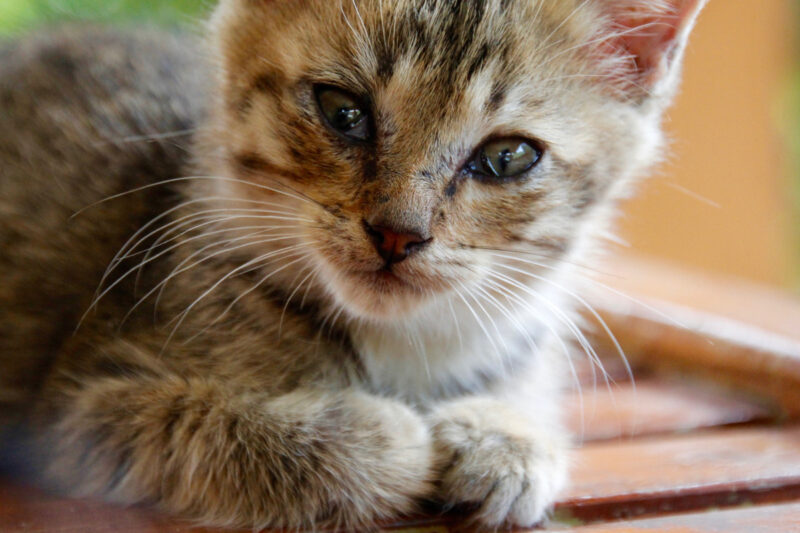
Written by Dr. Michelle Meckelborg
Feline Upper Respiratory infection (URI) has long been an important disease complex in shelter medicine. Historically, efforts were focused on identifying pathogens and crafting effective treatment protocols with many shelters defaulting to euthanasia to prevent spread of disease. With greater understanding of the negative effects of sheltering animals came the realization that addressing stress and crowding was as important or even more so, than a treatment protocol.
The most common pathogen associated with ocular manifestations of URI is herpes virus, which tends to also cause “the most severe/persistent and recurrent symptoms, causing 100% morbidity and notable mortality in susceptible kittens”. A recent study published in the Journal of Feline Medicine and Surgery looked at the addition of an oral anti-viral to standard treatment of feline upper respiratory infections (URI) in kittens.
In the study, 373 kittens (< 12 weeks old) with ocular manifestation of viral URI were randomly assigned into two groups:
Placebo group – standard treatment of oral doxycycline and ofloxacin eye drops every 12 hours for 21 days
or
Famciclovir group – standard treatment as noted above with the addition of oral famciclovir every 12 hours for 21 days
The working hypothesis was that addition of famciclovir would speed recovery and reduce severity of disease in affected kittens.
The Results
“Disease severity was strongly associated with time to outcomes, with severely affected kittens taking longer than mildly affected kittens to achieve ophthalmic or clinical recovery or resolution”.
Meaning, INTERVENE EARLY.
“ . . compared with those receiving only doxycycline, significantly fewer kittens treated with famciclovir developed corneal disease”.
Meaning, GOOD-BYE CORNEAL SEQUESTRUMS. SEE YOU LATER, ENUCLEATIONS.
“Although the administration of famciclovir may increase pharmaceutical costs and require increased staff time for medication administration, the decrease in LOS and increase in positive outcomes will improve animal welfare”.
Kittens in the famciclovir group reached clinical recovery 4-5 days earlier than placebo group. The daily MINIMUM cost to house/feed a kitten in a shelter setting varies between shelters but is estimated to be $13.45 in Western Canada. At time of publishing, the cost of famciclovir 21-day treatment course in Canada for an 800g kitten would be 47.60$.
Meaning, INCREASED CAPACITY FOR CARE.
Famciclovir tablets can be crushed and added directly to the doxycycline suspension prior to dosing.
Meaning, EASE OF ADMINISTRATION.
The Nitty-Gritty
Doxycyline oral suspension was dosed at 5 mg/kg PO BID x 21 days; dose re-calculated weekly based on body weight. Ofloxacin 3% ophthalmic solution was dosed at 1 drop in both eyes every 12 hours for 21 days. Famciclovir dose was approximate at 90 mg/kg BID; dose re-calculated weekly based on body weight.
Famciclovir was constituted by crushing commercially available tablets, weighing and placing into gelatin capsules using chart below.
All kittens were placed in foster as singles or with littermates.
Dose of famciclovir administered to kittens per body weight (dosage 90 mg/kg)
| Body Weight Range (kg) | Dose of Famciclovir in capsules (mg) |
| 0.20-0.29 | 31.25 |
| 0.30 -0.39 | 40 |
| 0.40-0.59 | 62.5 |
| 0.60-0.79 | 72 |
| 0.80-0.99 | 93.75 |
| 1.0-1.19 | 108 |
| 1.20-1.39 | 125 |
| 1.40-1.59 | 144 |
| 1.60-1.79 | 162 |
| 1.80-1.99 | 180 |
| 2.0-2.19 | 202 |
References
Vernau KM, Kim S, Thomasy SM, et al. Doxycycline with or without famciclovir for infectious ophthalmic and respiratory disease: a prospective, randomized, masked, placebo-controlled trial in 373 kittens. Journal of Feline Medicine and Surgery. 2024;26(11). doi:10.1177/1098612X241278413
